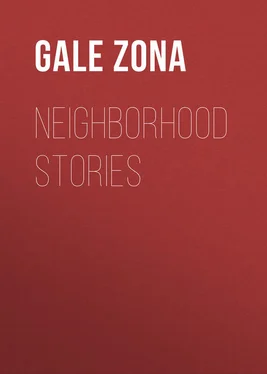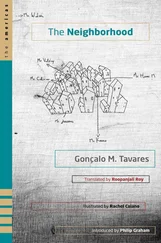Zona Gale - Neighborhood Stories
Здесь есть возможность читать онлайн «Zona Gale - Neighborhood Stories» — ознакомительный отрывок электронной книги совершенно бесплатно, а после прочтения отрывка купить полную версию. В некоторых случаях можно слушать аудио, скачать через торрент в формате fb2 и присутствует краткое содержание. Жанр: foreign_antique, foreign_prose, на английском языке. Описание произведения, (предисловие) а так же отзывы посетителей доступны на портале библиотеки ЛибКат.
- Название:Neighborhood Stories
- Автор:
- Жанр:
- Год:неизвестен
- ISBN:нет данных
- Рейтинг книги:3 / 5. Голосов: 1
-
Избранное:Добавить в избранное
- Отзывы:
-
Ваша оценка:
- 60
- 1
- 2
- 3
- 4
- 5
Neighborhood Stories: краткое содержание, описание и аннотация
Предлагаем к чтению аннотацию, описание, краткое содержание или предисловие (зависит от того, что написал сам автор книги «Neighborhood Stories»). Если вы не нашли необходимую информацию о книге — напишите в комментариях, мы постараемся отыскать её.
Neighborhood Stories — читать онлайн ознакомительный отрывок
Ниже представлен текст книги, разбитый по страницам. Система сохранения места последней прочитанной страницы, позволяет с удобством читать онлайн бесплатно книгу «Neighborhood Stories», без необходимости каждый раз заново искать на чём Вы остановились. Поставьте закладку, и сможете в любой момент перейти на страницу, на которой закончили чтение.
Интервал:
Закладка:
“Evenin’, Ab,” says I. “How’s Gertie?”
“She ain’t on her feet yet,” says he, rueful.
“How’s your mother’s rheumatism?”
“It ain’t in her fingers yet,” says he, bright.
“How’re you?”
“Oh, me!” he says. “I’m rosy.”
“Your arm,” says I; “will it let you go to work yet?”
“Not yet,” he says, “the thermometer actin’ up zero, so. But still, I’m rosy – rosy.”
“Well,” says I, “bein’ you’re more rosy than busy, I wonder if you couldn’t do something for us ladies. You know,” I says, “that nice, new, galvanized iron garbage tank us ladies bought and run one season, collectin’ up garbage? Well, I dunno but what we’ve got to sell it, the Council refusin’ to run it, ’count of economy. And I wondered if you’d go and hev a look at it, and tell us what we’d ought to get for it, and where.”
“Why, sure I will,” says Absalom. “I’d be glad,” says he, kind of pleasant and important, “to accommodate.”
He went off down the street, walking sidewise, like he does, his coat and beard blowing out the same side, his pockets sagging till they looked like mouths smiling, and his hat trained up to a peak. Everybody liked Absalom – he had such a nice, one-sided smile and he seemed to be so afraid he was going to hurt your feelings. He’d broke his right arm in Silas’s canning factory that fall, and he’d been laying off ever since. His wife done washings, and his mother finished vests from the city, and the children stuffed up cracks in the walls and thought it was a game.
They was others in the town, come lately, and mostly in the factory, that was the same way: the Bettses and the Doles and the Haskitts and the Hennings. They lived in little shacks around, and the men worked in the canning factory and the gas-works and on the tracks, and the women helped out. And one or two of ’em had took down ill; and so it was Silas, that likes to think of things first, that up and said “do something.” And it was him put the notice in the papers a few nights later to all citizens – and women – that’s interested in forming a Charity Society to meet in Post-Office Hall, that he has the renting of.
I was turning in the stairway to the hall that night when I heard somebody singing. And coming down the walk, with her hat on crooked and its feather broke, was old Bess Bones. Bess has lived in Friendship Village for years – and I always thought it was real good for the town that she done so. For she is the only woman I ever knew of that ain’t respectable, and ain’t rich or famous either, and yet that goes to everybody’s house.
She does cleaning and scrubbing, and we all like to get her to do it, she does it so thoroughly conscientious. She brings us in little remedies she knows about, and vegetables from her own garden, and eggs. Sometimes some of us asks her to set down to a meal. Once she brought me a picked chicken of hers. And it’s good for Friendship Village because we all see she’s human, and mostly with women like that we build a thick wall and don’t give ’em a chance to even knock out a brick ever after.
“I was just goin’ to see you, Miss Marsh,” she says. “I got kind o’ lonesome and I thought I’d bring you over a begonia slip and set a while.”
“I’m sorry, Bess,” I says. “I’m going to a meeting.”
“What kind of meetin’?” she says. “P’litical?”
“Yes,” I says, “something like that.” And that was true, of course, being politics is so often carried on by private charity from the candidates.
“I’d kind of like to go to a meeting again,” she says, wistful. “I sung to revival meetings for a month once, when I was a girl.”
“I guess you wouldn’t like this one,” I says. “Come to see me to-morrow and I’ll tell you about it.”
And then I went up-stairs and left her standing there on the sidewalk, and I felt kind of ashamed and sneaking. I didn’t know why. But I says to myself, comforting, that she’d probably of broke out and sung in the middle of the meeting, if she had come. Her head ain’t right, like the most of ours; but hers takes noisy forms, so you notice more.
Eleven of us turned out to the meeting, which was a pretty good proportion, there being only fifteen hundred living in Friendship Village all together. Silas was in the chair, formal as a funeral.
“The idear, as I understand it,” says Silas, when the meeting was open, “is to get some Charity going. We’d ought to organize.”
“And then what?” asks Mis’ Toplady.
“Why, commence distributin’ duds and victuals,” says Silas.
“Well-a,” says Mis’ Toplady, “and keep on distributing them all our lives?”
“Sure,” says Silas, “unless you’re goin’ to be weary in well-doing. Them folks’ll keep right on being hungry and nekked as long as they live.”
“Why will they?” says Mis’ Toplady, puzzled.
“Well, they’re poor folks, ain’t they?” says Silas, scowling.
“Why, yes,” says Mis’ Toplady; “but that ain’t all they is to ’em, is it?”
“What do you mean ?” says Silas.
“Why, I mean,” says Mis’ Toplady, “can’t they be got goin’ so’s they sha’n’t be poor folks?”
Silas used his face like he smelled something. “Don’t you know no more about folks than that?” says he. “Facts is facts. You’ve got to take folks as they are.”
“But you ain’t taking folks nowheres. You’re leavin’ ’em as they are, Silas,” says Mis’ Toplady, troubled.
Mis’ Silas Sykes spoke up with her way of measuring off just enough for everybody.
“It’s this way Silas means,” she says. “Folks are rich, or medium, or poor. We’ve got to face that. It’s always been so.”
Mis’ Toplady kind of bit at her lower lip a few times in a way she has, that wrinkles up her nose meditative. “It don’t follow out,” she says, firm. “My back yard used to be all chickweed. Now it’s pure potatoes.”
“Folks,” says Mis’ Sykes, real witherin’, “folks ain’t dirt.”
“That’s what I thought,” says Mis’ Toplady, dry.
Silas went right over their heads, like he does.
“We’ve all been doin’ what we could for these folks,” he says, “but we ain’t been doin’ it real wise. It’s come to my notice that the Haskitts had four different chickens give to ’em last Christmas. What we want to do is to fix up some sort of a organization so’s our chickens won’t lap.”
“Well,” says Timothy Toplady, “then let’s organize. That ain’t hard. I move it be done.”
It was done, and Silas was made president, like he ever loves to be, and Timothy treasurer, and me secretary, because they could get me to take it.
“Now,” says Silas, “let’s get down to work and talk over cases.”
“ Cases! ” says Mis’ Toplady, distasteful. “They ain’t got the smallpox, have they? Say folks .”
“I guess you ain’t very used to Charity societies,” says Silas, tolerant. “Take the Haskitts. They ain’t got a pane o’ glass in their house.”
“Nor no wood, much,” says Timothy. “When I went to get the rent the cat was asleep on the cook-stove.”
“What rent do they give you, Timothy?” says Silas.
“Five dollars,” he says, pursin’ his lips.
“That’s only three per cent. on the money. I don’t see how you can afford it.”
“I am indulgin’ myself a little,” Timothy admits. “But I been thinkin’ o’ raisin’ it to six. One thing, though; I ain’t give ’em any repairs. If I’d had a six-dollar family in there I’d had to fixed the window-glass and cleaned out the cistern and mended the roof. It about evens itself up.”
Читать дальшеИнтервал:
Закладка:
Похожие книги на «Neighborhood Stories»
Представляем Вашему вниманию похожие книги на «Neighborhood Stories» списком для выбора. Мы отобрали схожую по названию и смыслу литературу в надежде предоставить читателям больше вариантов отыскать новые, интересные, ещё непрочитанные произведения.
Обсуждение, отзывы о книге «Neighborhood Stories» и просто собственные мнения читателей. Оставьте ваши комментарии, напишите, что Вы думаете о произведении, его смысле или главных героях. Укажите что конкретно понравилось, а что нет, и почему Вы так считаете.












